Reflective Essay on Self-Care Recovery Journey and Overcoming Barriers
VerifiedAdded on 2022/11/13
|12
|2891
|363
Essay
AI Summary
This reflective essay details a student's personal journey towards self-care and recovery from excessive caffeine and sugar intake. The essay begins with an introduction outlining the need for a self-care plan and the student's specific goal to reduce Pepsi consumption. The student then describes their use of the SMART goal framework (Specific, Measurable, Achievable, Realistic, Timely) to achieve this objective, providing measurable data on their progress over five weeks. The essay explores the feelings and challenges faced at the beginning of the process, including cravings and psychological barriers. It highlights the importance of a support network, primarily consisting of family members, and how their encouragement and practical help contributed to the student's success. The essay also discusses the recovery process, including the development of willpower and the similarities between the student's experience and that of individuals with mental illnesses. Finally, the essay reflects on the lessons learned and the positive impact of the self-care journey on the student's mental and physical well-being.
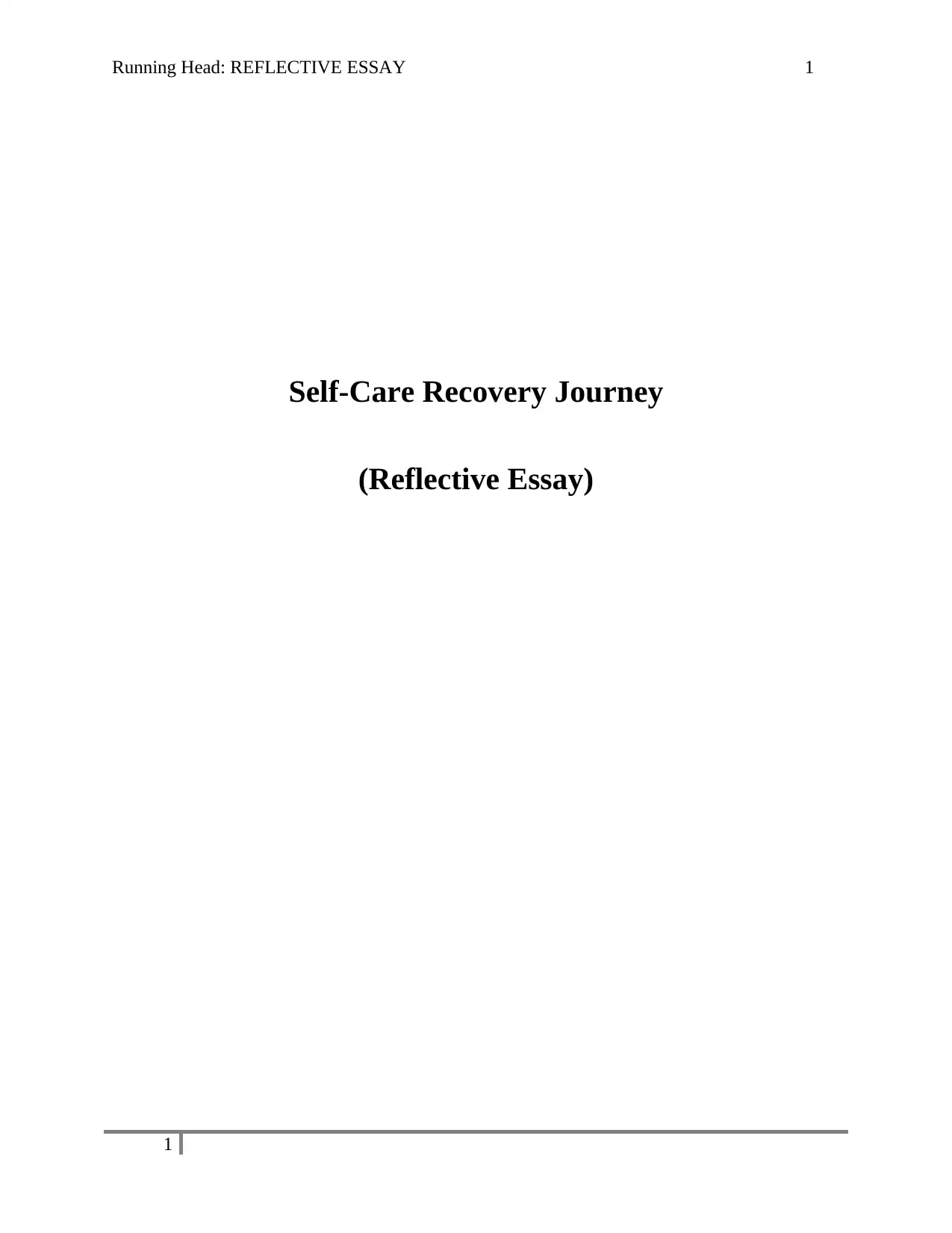
Running Head: REFLECTIVE ESSAY 1
Self-Care Recovery Journey
(Reflective Essay)
1
Self-Care Recovery Journey
(Reflective Essay)
1
Paraphrase This Document
Need a fresh take? Get an instant paraphrase of this document with our AI Paraphraser
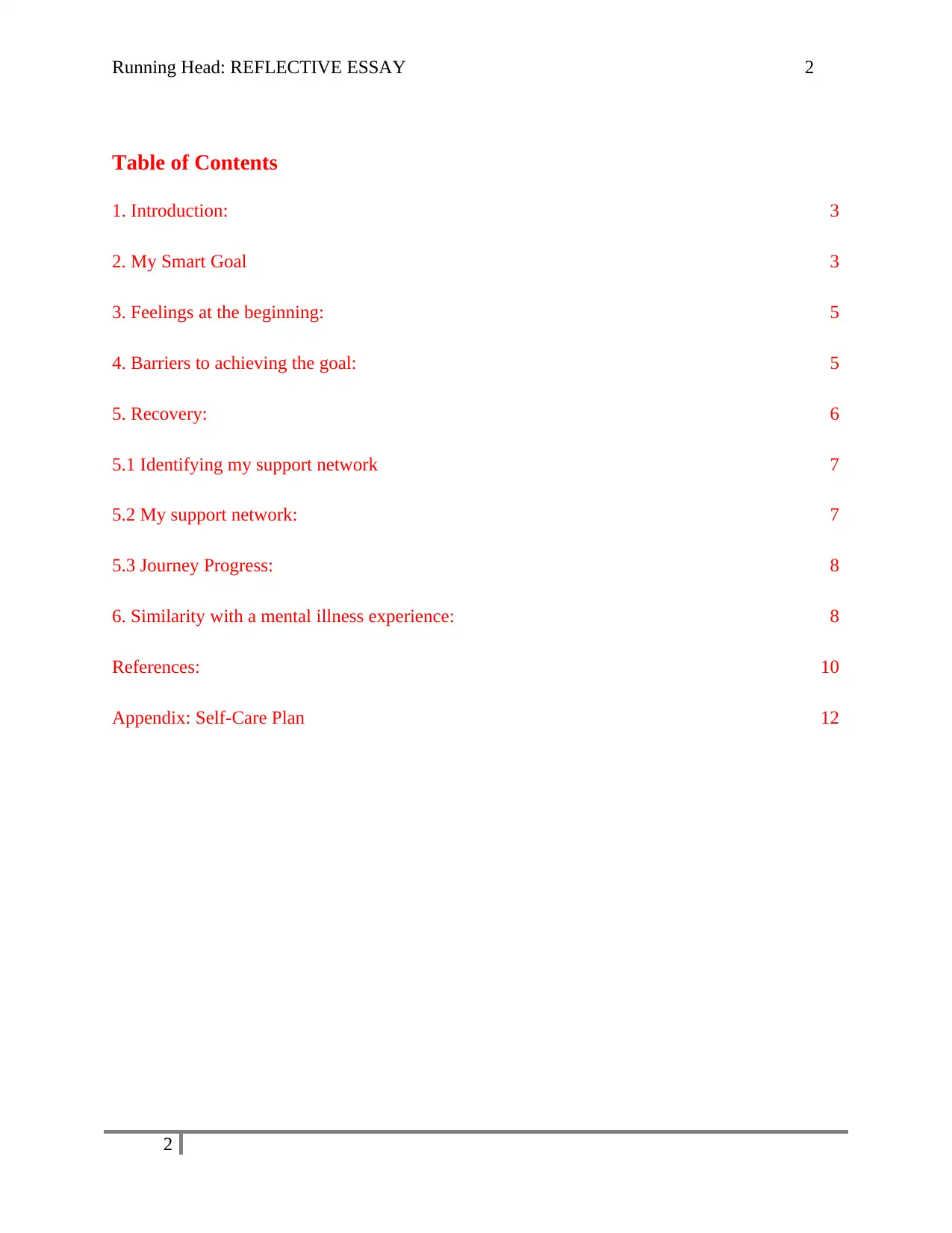
Running Head: REFLECTIVE ESSAY 2
Table of Contents
1. Introduction: 3
2. My Smart Goal 3
3. Feelings at the beginning: 5
4. Barriers to achieving the goal: 5
5. Recovery: 6
5.1 Identifying my support network 7
5.2 My support network: 7
5.3 Journey Progress: 8
6. Similarity with a mental illness experience: 8
References: 10
Appendix: Self-Care Plan 12
2
Table of Contents
1. Introduction: 3
2. My Smart Goal 3
3. Feelings at the beginning: 5
4. Barriers to achieving the goal: 5
5. Recovery: 6
5.1 Identifying my support network 7
5.2 My support network: 7
5.3 Journey Progress: 8
6. Similarity with a mental illness experience: 8
References: 10
Appendix: Self-Care Plan 12
2
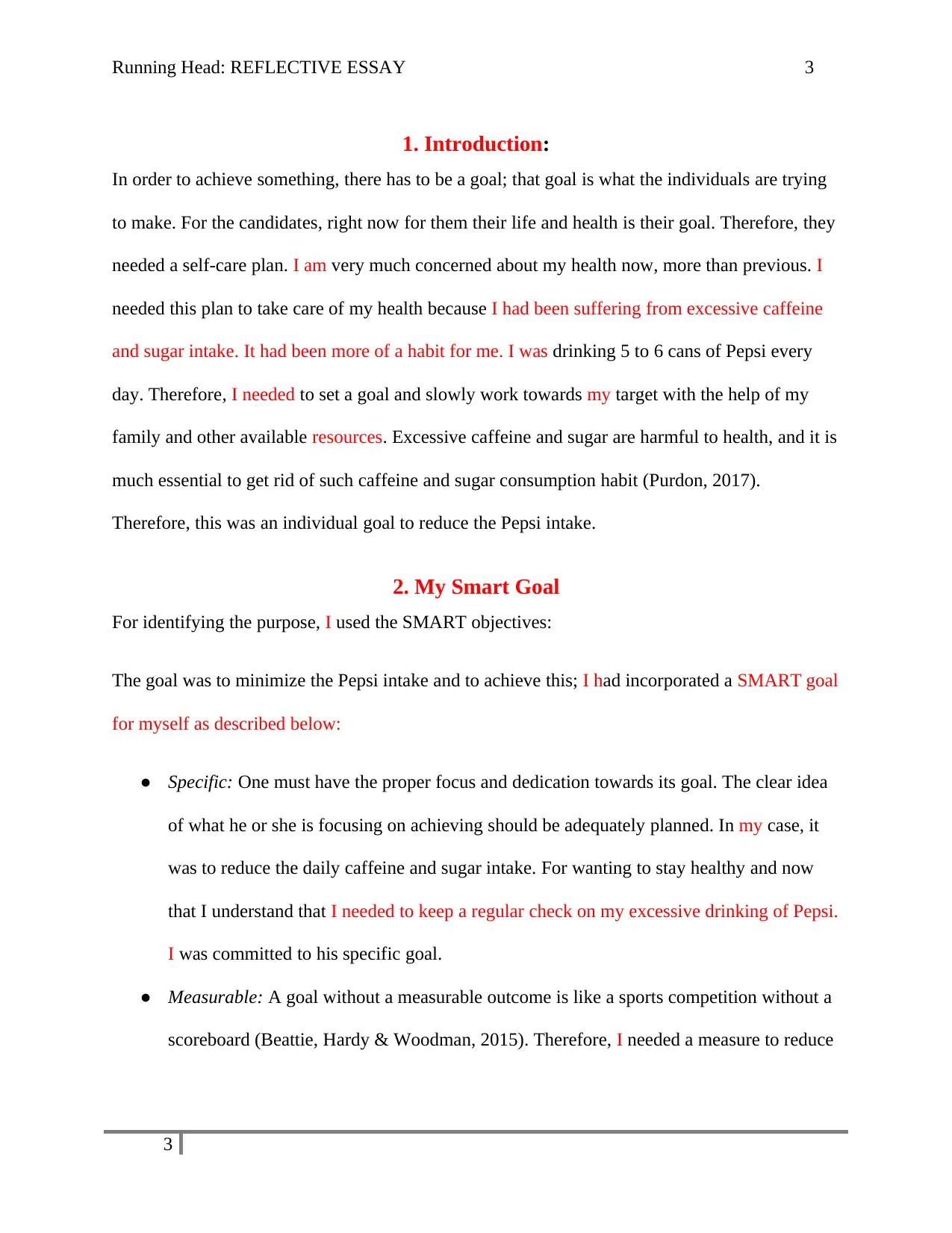
Running Head: REFLECTIVE ESSAY 3
1. Introduction:
In order to achieve something, there has to be a goal; that goal is what the individuals are trying
to make. For the candidates, right now for them their life and health is their goal. Therefore, they
needed a self-care plan. I am very much concerned about my health now, more than previous. I
needed this plan to take care of my health because I had been suffering from excessive caffeine
and sugar intake. It had been more of a habit for me. I was drinking 5 to 6 cans of Pepsi every
day. Therefore, I needed to set a goal and slowly work towards my target with the help of my
family and other available resources. Excessive caffeine and sugar are harmful to health, and it is
much essential to get rid of such caffeine and sugar consumption habit (Purdon, 2017).
Therefore, this was an individual goal to reduce the Pepsi intake.
2. My Smart Goal
For identifying the purpose, I used the SMART objectives:
The goal was to minimize the Pepsi intake and to achieve this; I had incorporated a SMART goal
for myself as described below:
● Specific: One must have the proper focus and dedication towards its goal. The clear idea
of what he or she is focusing on achieving should be adequately planned. In my case, it
was to reduce the daily caffeine and sugar intake. For wanting to stay healthy and now
that I understand that I needed to keep a regular check on my excessive drinking of Pepsi.
I was committed to his specific goal.
● Measurable: A goal without a measurable outcome is like a sports competition without a
scoreboard (Beattie, Hardy & Woodman, 2015). Therefore, I needed a measure to reduce
3
1. Introduction:
In order to achieve something, there has to be a goal; that goal is what the individuals are trying
to make. For the candidates, right now for them their life and health is their goal. Therefore, they
needed a self-care plan. I am very much concerned about my health now, more than previous. I
needed this plan to take care of my health because I had been suffering from excessive caffeine
and sugar intake. It had been more of a habit for me. I was drinking 5 to 6 cans of Pepsi every
day. Therefore, I needed to set a goal and slowly work towards my target with the help of my
family and other available resources. Excessive caffeine and sugar are harmful to health, and it is
much essential to get rid of such caffeine and sugar consumption habit (Purdon, 2017).
Therefore, this was an individual goal to reduce the Pepsi intake.
2. My Smart Goal
For identifying the purpose, I used the SMART objectives:
The goal was to minimize the Pepsi intake and to achieve this; I had incorporated a SMART goal
for myself as described below:
● Specific: One must have the proper focus and dedication towards its goal. The clear idea
of what he or she is focusing on achieving should be adequately planned. In my case, it
was to reduce the daily caffeine and sugar intake. For wanting to stay healthy and now
that I understand that I needed to keep a regular check on my excessive drinking of Pepsi.
I was committed to his specific goal.
● Measurable: A goal without a measurable outcome is like a sports competition without a
scoreboard (Beattie, Hardy & Woodman, 2015). Therefore, I needed a measure to reduce
3
⊘ This is a preview!⊘
Do you want full access?
Subscribe today to unlock all pages.

Trusted by 1+ million students worldwide
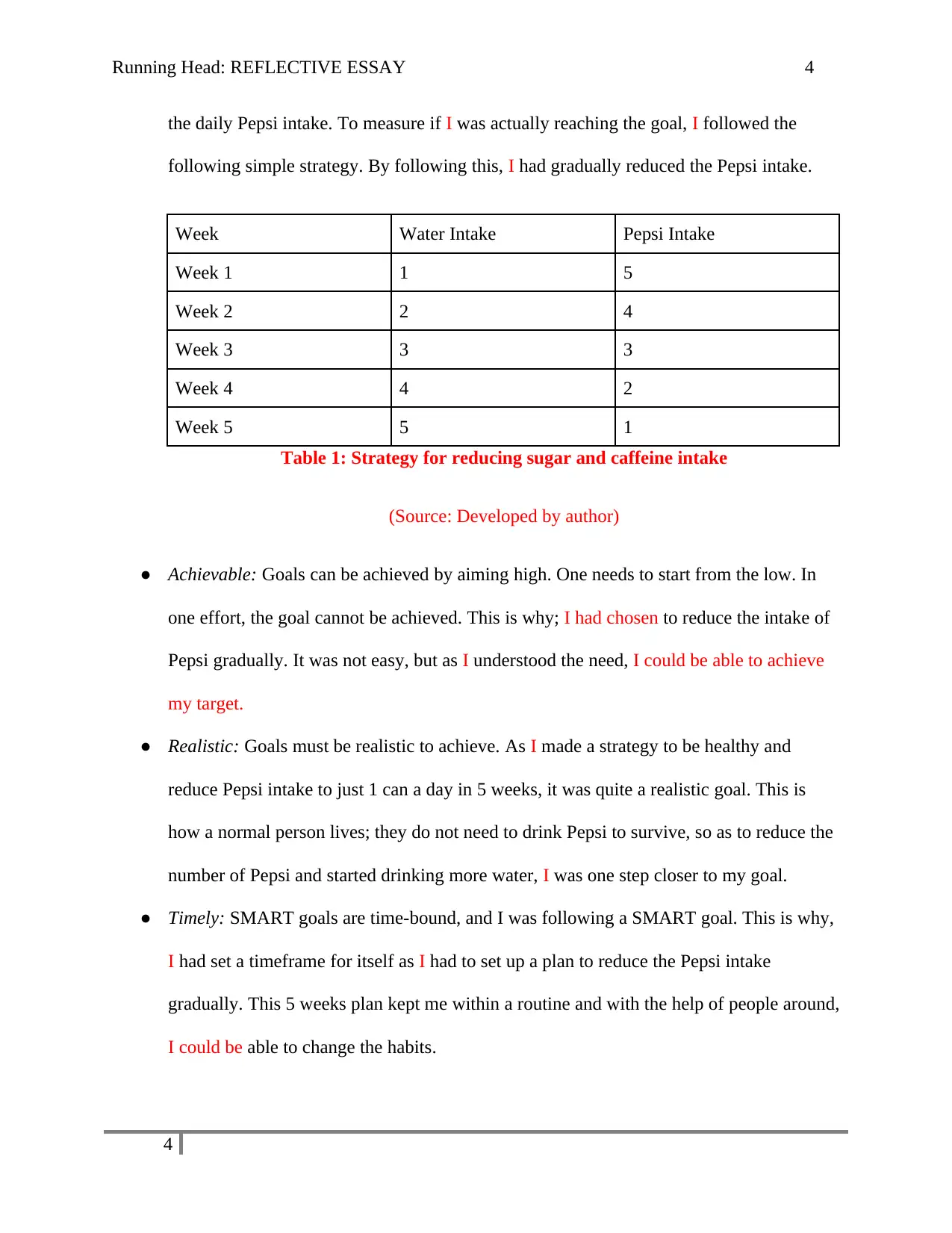
Running Head: REFLECTIVE ESSAY 4
the daily Pepsi intake. To measure if I was actually reaching the goal, I followed the
following simple strategy. By following this, I had gradually reduced the Pepsi intake.
Week Water Intake Pepsi Intake
Week 1 1 5
Week 2 2 4
Week 3 3 3
Week 4 4 2
Week 5 5 1
Table 1: Strategy for reducing sugar and caffeine intake
(Source: Developed by author)
● Achievable: Goals can be achieved by aiming high. One needs to start from the low. In
one effort, the goal cannot be achieved. This is why; I had chosen to reduce the intake of
Pepsi gradually. It was not easy, but as I understood the need, I could be able to achieve
my target.
● Realistic: Goals must be realistic to achieve. As I made a strategy to be healthy and
reduce Pepsi intake to just 1 can a day in 5 weeks, it was quite a realistic goal. This is
how a normal person lives; they do not need to drink Pepsi to survive, so as to reduce the
number of Pepsi and started drinking more water, I was one step closer to my goal.
● Timely: SMART goals are time-bound, and I was following a SMART goal. This is why,
I had set a timeframe for itself as I had to set up a plan to reduce the Pepsi intake
gradually. This 5 weeks plan kept me within a routine and with the help of people around,
I could be able to change the habits.
4
the daily Pepsi intake. To measure if I was actually reaching the goal, I followed the
following simple strategy. By following this, I had gradually reduced the Pepsi intake.
Week Water Intake Pepsi Intake
Week 1 1 5
Week 2 2 4
Week 3 3 3
Week 4 4 2
Week 5 5 1
Table 1: Strategy for reducing sugar and caffeine intake
(Source: Developed by author)
● Achievable: Goals can be achieved by aiming high. One needs to start from the low. In
one effort, the goal cannot be achieved. This is why; I had chosen to reduce the intake of
Pepsi gradually. It was not easy, but as I understood the need, I could be able to achieve
my target.
● Realistic: Goals must be realistic to achieve. As I made a strategy to be healthy and
reduce Pepsi intake to just 1 can a day in 5 weeks, it was quite a realistic goal. This is
how a normal person lives; they do not need to drink Pepsi to survive, so as to reduce the
number of Pepsi and started drinking more water, I was one step closer to my goal.
● Timely: SMART goals are time-bound, and I was following a SMART goal. This is why,
I had set a timeframe for itself as I had to set up a plan to reduce the Pepsi intake
gradually. This 5 weeks plan kept me within a routine and with the help of people around,
I could be able to change the habits.
4
Paraphrase This Document
Need a fresh take? Get an instant paraphrase of this document with our AI Paraphraser
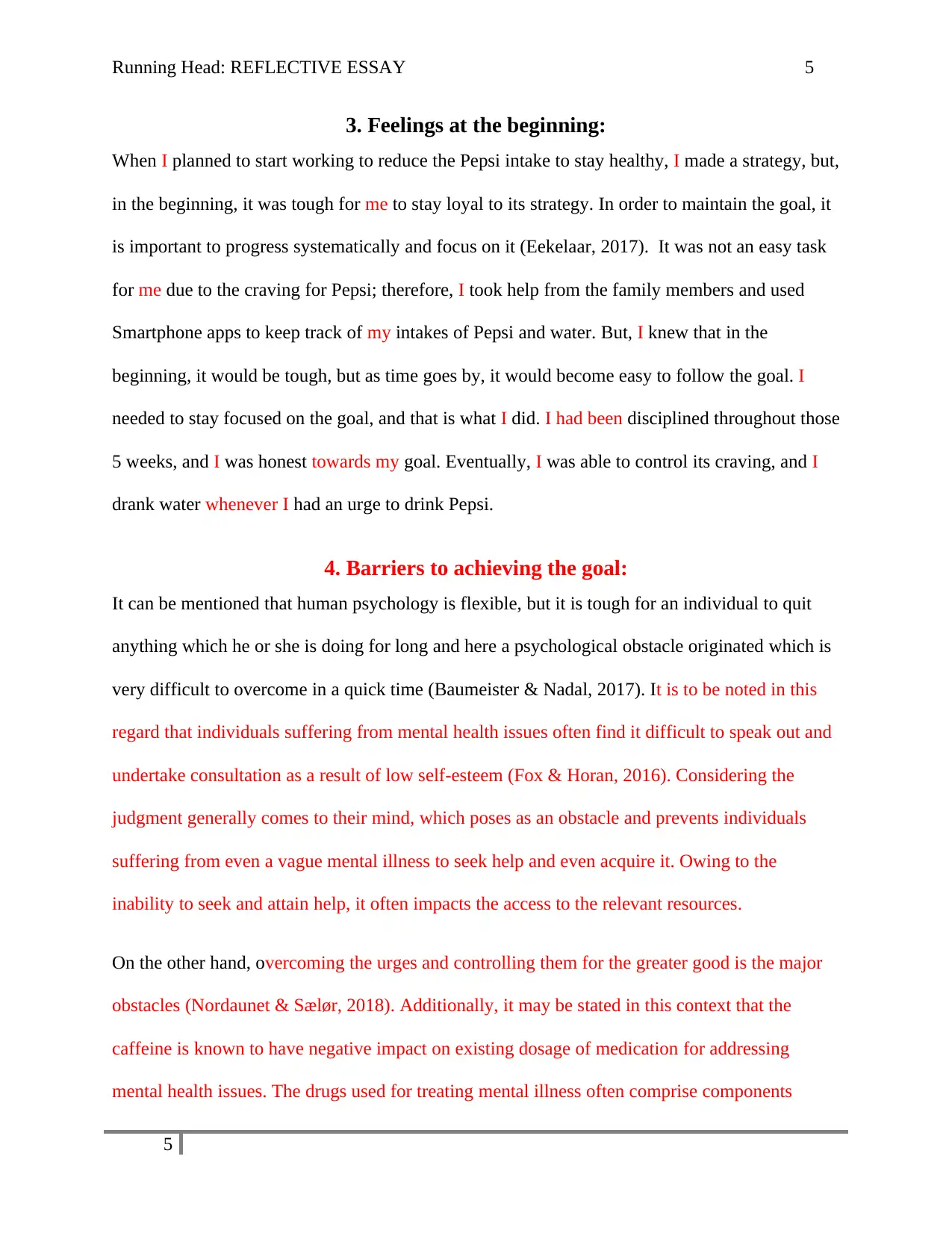
Running Head: REFLECTIVE ESSAY 5
3. Feelings at the beginning:
When I planned to start working to reduce the Pepsi intake to stay healthy, I made a strategy, but,
in the beginning, it was tough for me to stay loyal to its strategy. In order to maintain the goal, it
is important to progress systematically and focus on it (Eekelaar, 2017). It was not an easy task
for me due to the craving for Pepsi; therefore, I took help from the family members and used
Smartphone apps to keep track of my intakes of Pepsi and water. But, I knew that in the
beginning, it would be tough, but as time goes by, it would become easy to follow the goal. I
needed to stay focused on the goal, and that is what I did. I had been disciplined throughout those
5 weeks, and I was honest towards my goal. Eventually, I was able to control its craving, and I
drank water whenever I had an urge to drink Pepsi.
4. Barriers to achieving the goal:
It can be mentioned that human psychology is flexible, but it is tough for an individual to quit
anything which he or she is doing for long and here a psychological obstacle originated which is
very difficult to overcome in a quick time (Baumeister & Nadal, 2017). It is to be noted in this
regard that individuals suffering from mental health issues often find it difficult to speak out and
undertake consultation as a result of low self-esteem (Fox & Horan, 2016). Considering the
judgment generally comes to their mind, which poses as an obstacle and prevents individuals
suffering from even a vague mental illness to seek help and even acquire it. Owing to the
inability to seek and attain help, it often impacts the access to the relevant resources.
On the other hand, overcoming the urges and controlling them for the greater good is the major
obstacles (Nordaunet & Sælør, 2018). Additionally, it may be stated in this context that the
caffeine is known to have negative impact on existing dosage of medication for addressing
mental health issues. The drugs used for treating mental illness often comprise components
5
3. Feelings at the beginning:
When I planned to start working to reduce the Pepsi intake to stay healthy, I made a strategy, but,
in the beginning, it was tough for me to stay loyal to its strategy. In order to maintain the goal, it
is important to progress systematically and focus on it (Eekelaar, 2017). It was not an easy task
for me due to the craving for Pepsi; therefore, I took help from the family members and used
Smartphone apps to keep track of my intakes of Pepsi and water. But, I knew that in the
beginning, it would be tough, but as time goes by, it would become easy to follow the goal. I
needed to stay focused on the goal, and that is what I did. I had been disciplined throughout those
5 weeks, and I was honest towards my goal. Eventually, I was able to control its craving, and I
drank water whenever I had an urge to drink Pepsi.
4. Barriers to achieving the goal:
It can be mentioned that human psychology is flexible, but it is tough for an individual to quit
anything which he or she is doing for long and here a psychological obstacle originated which is
very difficult to overcome in a quick time (Baumeister & Nadal, 2017). It is to be noted in this
regard that individuals suffering from mental health issues often find it difficult to speak out and
undertake consultation as a result of low self-esteem (Fox & Horan, 2016). Considering the
judgment generally comes to their mind, which poses as an obstacle and prevents individuals
suffering from even a vague mental illness to seek help and even acquire it. Owing to the
inability to seek and attain help, it often impacts the access to the relevant resources.
On the other hand, overcoming the urges and controlling them for the greater good is the major
obstacles (Nordaunet & Sælør, 2018). Additionally, it may be stated in this context that the
caffeine is known to have negative impact on existing dosage of medication for addressing
mental health issues. The drugs used for treating mental illness often comprise components
5
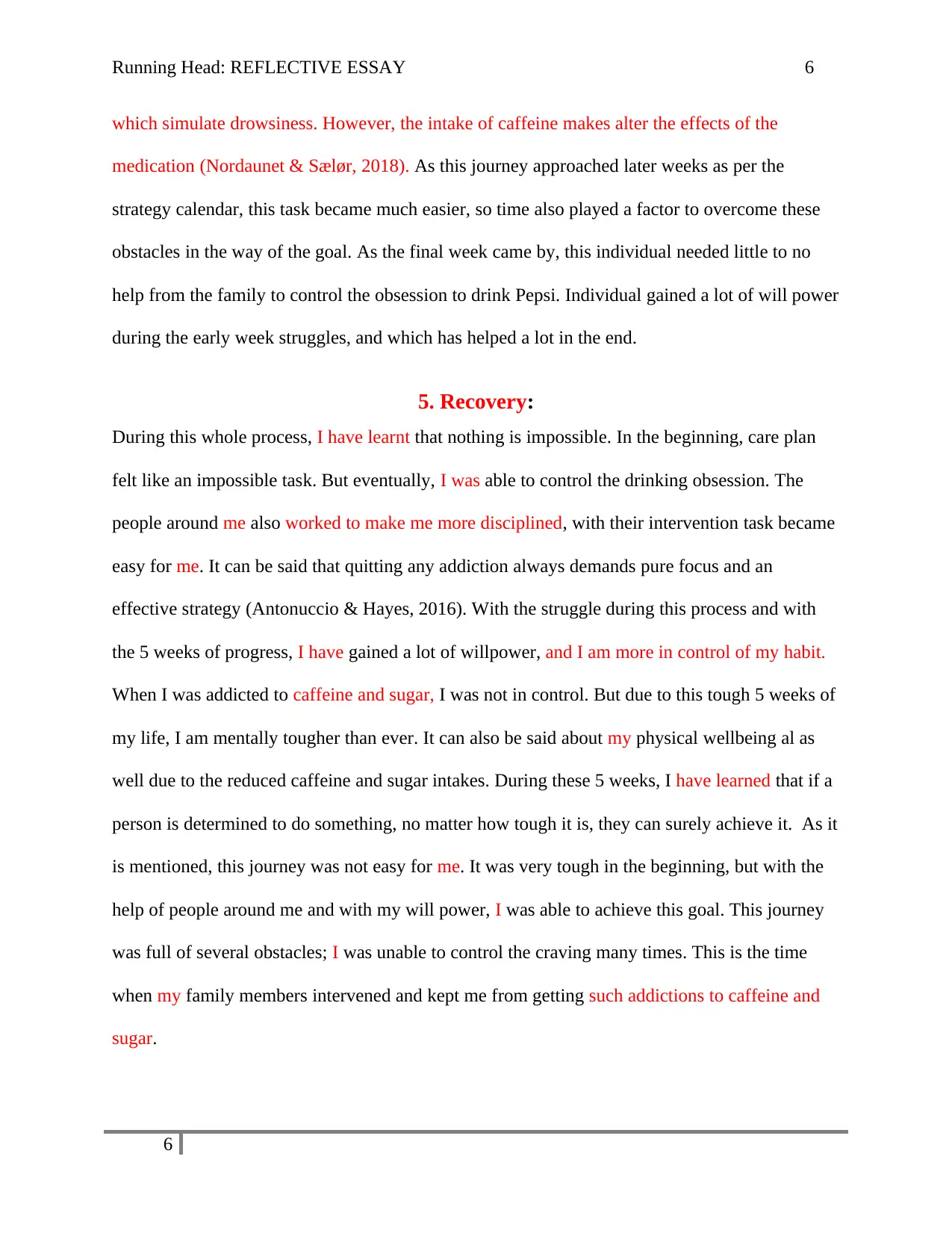
Running Head: REFLECTIVE ESSAY 6
which simulate drowsiness. However, the intake of caffeine makes alter the effects of the
medication (Nordaunet & Sælør, 2018). As this journey approached later weeks as per the
strategy calendar, this task became much easier, so time also played a factor to overcome these
obstacles in the way of the goal. As the final week came by, this individual needed little to no
help from the family to control the obsession to drink Pepsi. Individual gained a lot of will power
during the early week struggles, and which has helped a lot in the end.
5. Recovery:
During this whole process, I have learnt that nothing is impossible. In the beginning, care plan
felt like an impossible task. But eventually, I was able to control the drinking obsession. The
people around me also worked to make me more disciplined, with their intervention task became
easy for me. It can be said that quitting any addiction always demands pure focus and an
effective strategy (Antonuccio & Hayes, 2016). With the struggle during this process and with
the 5 weeks of progress, I have gained a lot of willpower, and I am more in control of my habit.
When I was addicted to caffeine and sugar, I was not in control. But due to this tough 5 weeks of
my life, I am mentally tougher than ever. It can also be said about my physical wellbeing al as
well due to the reduced caffeine and sugar intakes. During these 5 weeks, I have learned that if a
person is determined to do something, no matter how tough it is, they can surely achieve it. As it
is mentioned, this journey was not easy for me. It was very tough in the beginning, but with the
help of people around me and with my will power, I was able to achieve this goal. This journey
was full of several obstacles; I was unable to control the craving many times. This is the time
when my family members intervened and kept me from getting such addictions to caffeine and
sugar.
6
which simulate drowsiness. However, the intake of caffeine makes alter the effects of the
medication (Nordaunet & Sælør, 2018). As this journey approached later weeks as per the
strategy calendar, this task became much easier, so time also played a factor to overcome these
obstacles in the way of the goal. As the final week came by, this individual needed little to no
help from the family to control the obsession to drink Pepsi. Individual gained a lot of will power
during the early week struggles, and which has helped a lot in the end.
5. Recovery:
During this whole process, I have learnt that nothing is impossible. In the beginning, care plan
felt like an impossible task. But eventually, I was able to control the drinking obsession. The
people around me also worked to make me more disciplined, with their intervention task became
easy for me. It can be said that quitting any addiction always demands pure focus and an
effective strategy (Antonuccio & Hayes, 2016). With the struggle during this process and with
the 5 weeks of progress, I have gained a lot of willpower, and I am more in control of my habit.
When I was addicted to caffeine and sugar, I was not in control. But due to this tough 5 weeks of
my life, I am mentally tougher than ever. It can also be said about my physical wellbeing al as
well due to the reduced caffeine and sugar intakes. During these 5 weeks, I have learned that if a
person is determined to do something, no matter how tough it is, they can surely achieve it. As it
is mentioned, this journey was not easy for me. It was very tough in the beginning, but with the
help of people around me and with my will power, I was able to achieve this goal. This journey
was full of several obstacles; I was unable to control the craving many times. This is the time
when my family members intervened and kept me from getting such addictions to caffeine and
sugar.
6
⊘ This is a preview!⊘
Do you want full access?
Subscribe today to unlock all pages.

Trusted by 1+ million students worldwide
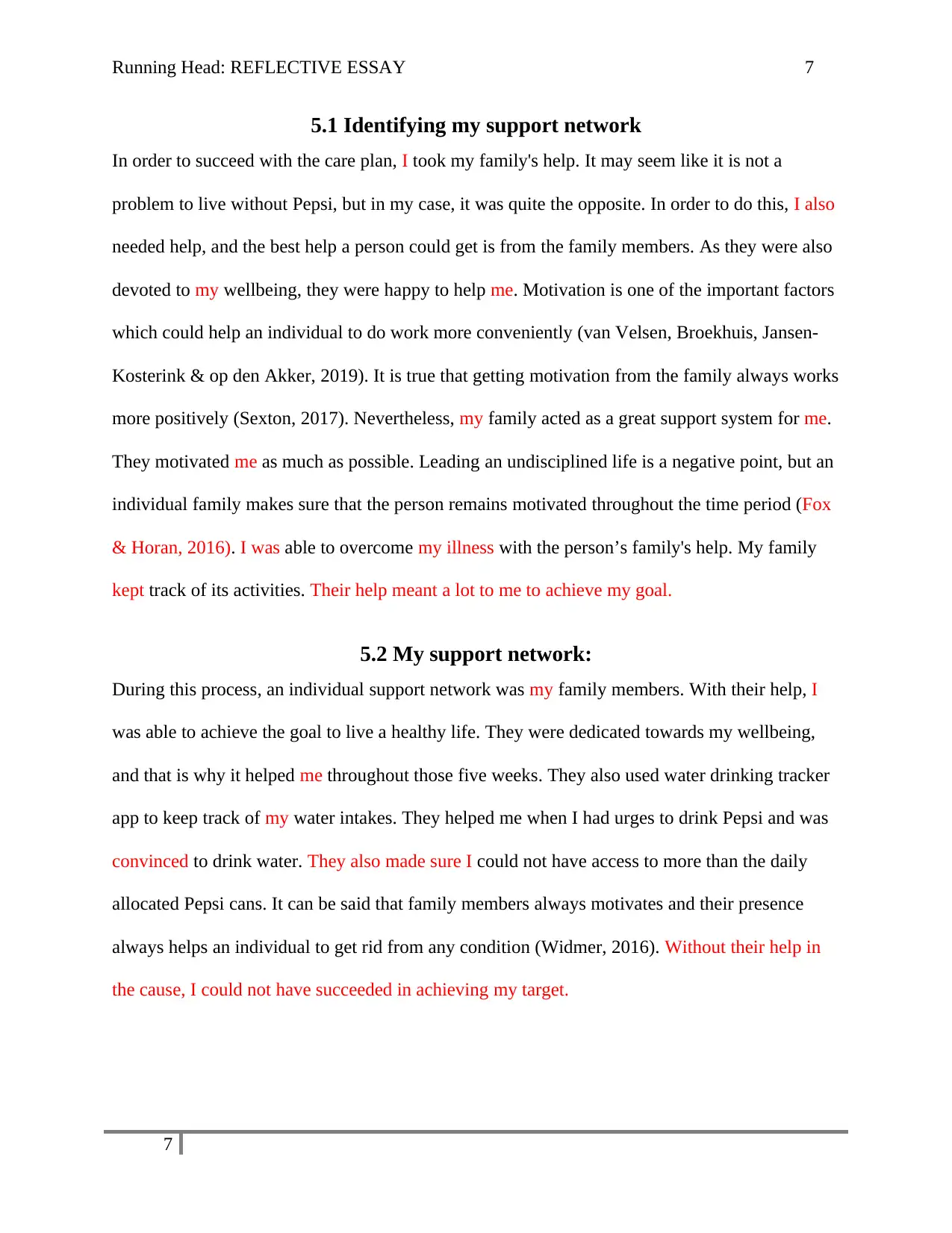
Running Head: REFLECTIVE ESSAY 7
5.1 Identifying my support network
In order to succeed with the care plan, I took my family's help. It may seem like it is not a
problem to live without Pepsi, but in my case, it was quite the opposite. In order to do this, I also
needed help, and the best help a person could get is from the family members. As they were also
devoted to my wellbeing, they were happy to help me. Motivation is one of the important factors
which could help an individual to do work more conveniently (van Velsen, Broekhuis, Jansen-
Kosterink & op den Akker, 2019). It is true that getting motivation from the family always works
more positively (Sexton, 2017). Nevertheless, my family acted as a great support system for me.
They motivated me as much as possible. Leading an undisciplined life is a negative point, but an
individual family makes sure that the person remains motivated throughout the time period (Fox
& Horan, 2016). I was able to overcome my illness with the person’s family's help. My family
kept track of its activities. Their help meant a lot to me to achieve my goal.
5.2 My support network:
During this process, an individual support network was my family members. With their help, I
was able to achieve the goal to live a healthy life. They were dedicated towards my wellbeing,
and that is why it helped me throughout those five weeks. They also used water drinking tracker
app to keep track of my water intakes. They helped me when I had urges to drink Pepsi and was
convinced to drink water. They also made sure I could not have access to more than the daily
allocated Pepsi cans. It can be said that family members always motivates and their presence
always helps an individual to get rid from any condition (Widmer, 2016). Without their help in
the cause, I could not have succeeded in achieving my target.
7
5.1 Identifying my support network
In order to succeed with the care plan, I took my family's help. It may seem like it is not a
problem to live without Pepsi, but in my case, it was quite the opposite. In order to do this, I also
needed help, and the best help a person could get is from the family members. As they were also
devoted to my wellbeing, they were happy to help me. Motivation is one of the important factors
which could help an individual to do work more conveniently (van Velsen, Broekhuis, Jansen-
Kosterink & op den Akker, 2019). It is true that getting motivation from the family always works
more positively (Sexton, 2017). Nevertheless, my family acted as a great support system for me.
They motivated me as much as possible. Leading an undisciplined life is a negative point, but an
individual family makes sure that the person remains motivated throughout the time period (Fox
& Horan, 2016). I was able to overcome my illness with the person’s family's help. My family
kept track of its activities. Their help meant a lot to me to achieve my goal.
5.2 My support network:
During this process, an individual support network was my family members. With their help, I
was able to achieve the goal to live a healthy life. They were dedicated towards my wellbeing,
and that is why it helped me throughout those five weeks. They also used water drinking tracker
app to keep track of my water intakes. They helped me when I had urges to drink Pepsi and was
convinced to drink water. They also made sure I could not have access to more than the daily
allocated Pepsi cans. It can be said that family members always motivates and their presence
always helps an individual to get rid from any condition (Widmer, 2016). Without their help in
the cause, I could not have succeeded in achieving my target.
7
Paraphrase This Document
Need a fresh take? Get an instant paraphrase of this document with our AI Paraphraser
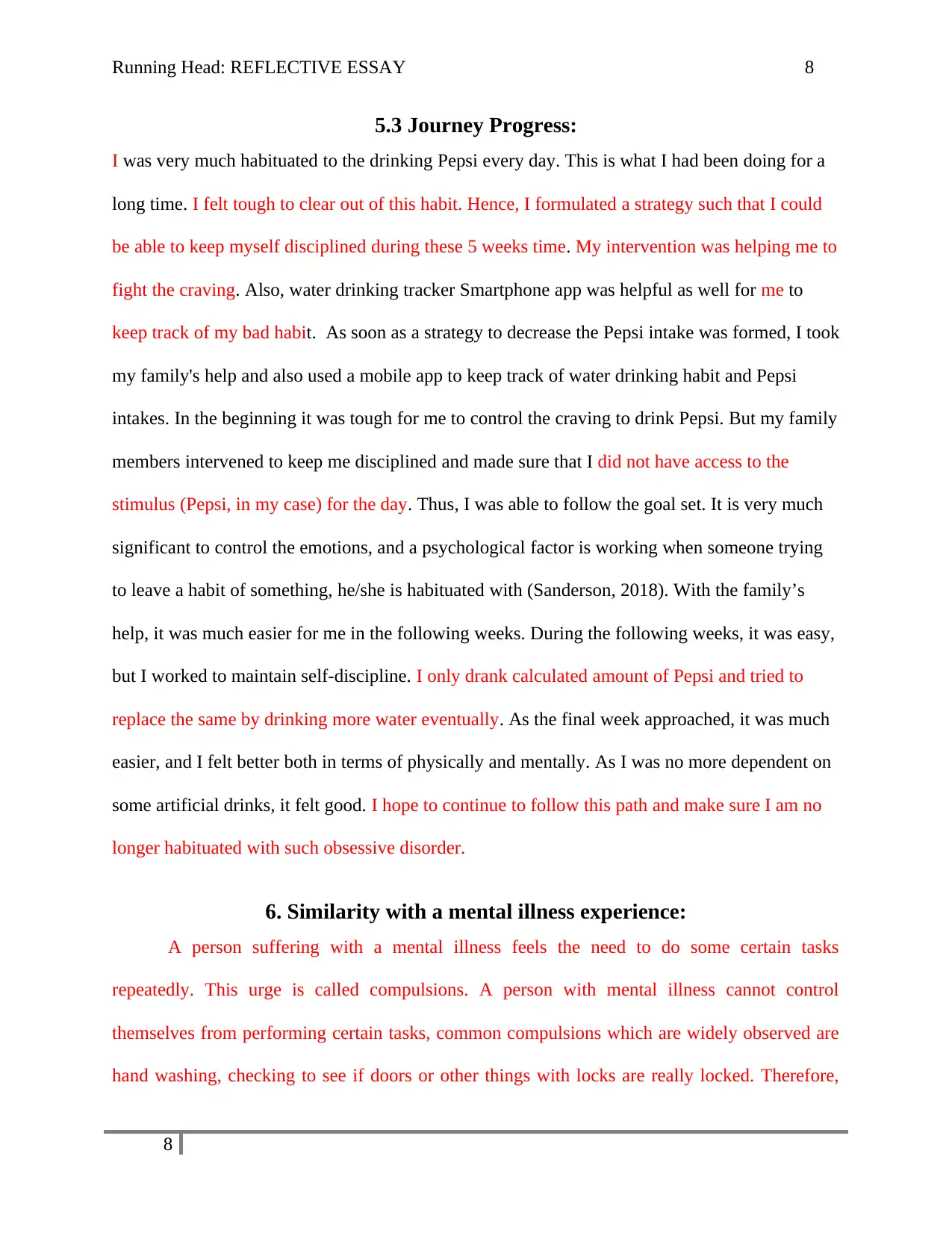
Running Head: REFLECTIVE ESSAY 8
5.3 Journey Progress:
I was very much habituated to the drinking Pepsi every day. This is what I had been doing for a
long time. I felt tough to clear out of this habit. Hence, I formulated a strategy such that I could
be able to keep myself disciplined during these 5 weeks time. My intervention was helping me to
fight the craving. Also, water drinking tracker Smartphone app was helpful as well for me to
keep track of my bad habit. As soon as a strategy to decrease the Pepsi intake was formed, I took
my family's help and also used a mobile app to keep track of water drinking habit and Pepsi
intakes. In the beginning it was tough for me to control the craving to drink Pepsi. But my family
members intervened to keep me disciplined and made sure that I did not have access to the
stimulus (Pepsi, in my case) for the day. Thus, I was able to follow the goal set. It is very much
significant to control the emotions, and a psychological factor is working when someone trying
to leave a habit of something, he/she is habituated with (Sanderson, 2018). With the family’s
help, it was much easier for me in the following weeks. During the following weeks, it was easy,
but I worked to maintain self-discipline. I only drank calculated amount of Pepsi and tried to
replace the same by drinking more water eventually. As the final week approached, it was much
easier, and I felt better both in terms of physically and mentally. As I was no more dependent on
some artificial drinks, it felt good. I hope to continue to follow this path and make sure I am no
longer habituated with such obsessive disorder.
6. Similarity with a mental illness experience:
A person suffering with a mental illness feels the need to do some certain tasks
repeatedly. This urge is called compulsions. A person with mental illness cannot control
themselves from performing certain tasks, common compulsions which are widely observed are
hand washing, checking to see if doors or other things with locks are really locked. Therefore,
8
5.3 Journey Progress:
I was very much habituated to the drinking Pepsi every day. This is what I had been doing for a
long time. I felt tough to clear out of this habit. Hence, I formulated a strategy such that I could
be able to keep myself disciplined during these 5 weeks time. My intervention was helping me to
fight the craving. Also, water drinking tracker Smartphone app was helpful as well for me to
keep track of my bad habit. As soon as a strategy to decrease the Pepsi intake was formed, I took
my family's help and also used a mobile app to keep track of water drinking habit and Pepsi
intakes. In the beginning it was tough for me to control the craving to drink Pepsi. But my family
members intervened to keep me disciplined and made sure that I did not have access to the
stimulus (Pepsi, in my case) for the day. Thus, I was able to follow the goal set. It is very much
significant to control the emotions, and a psychological factor is working when someone trying
to leave a habit of something, he/she is habituated with (Sanderson, 2018). With the family’s
help, it was much easier for me in the following weeks. During the following weeks, it was easy,
but I worked to maintain self-discipline. I only drank calculated amount of Pepsi and tried to
replace the same by drinking more water eventually. As the final week approached, it was much
easier, and I felt better both in terms of physically and mentally. As I was no more dependent on
some artificial drinks, it felt good. I hope to continue to follow this path and make sure I am no
longer habituated with such obsessive disorder.
6. Similarity with a mental illness experience:
A person suffering with a mental illness feels the need to do some certain tasks
repeatedly. This urge is called compulsions. A person with mental illness cannot control
themselves from performing certain tasks, common compulsions which are widely observed are
hand washing, checking to see if doors or other things with locks are really locked. Therefore,
8
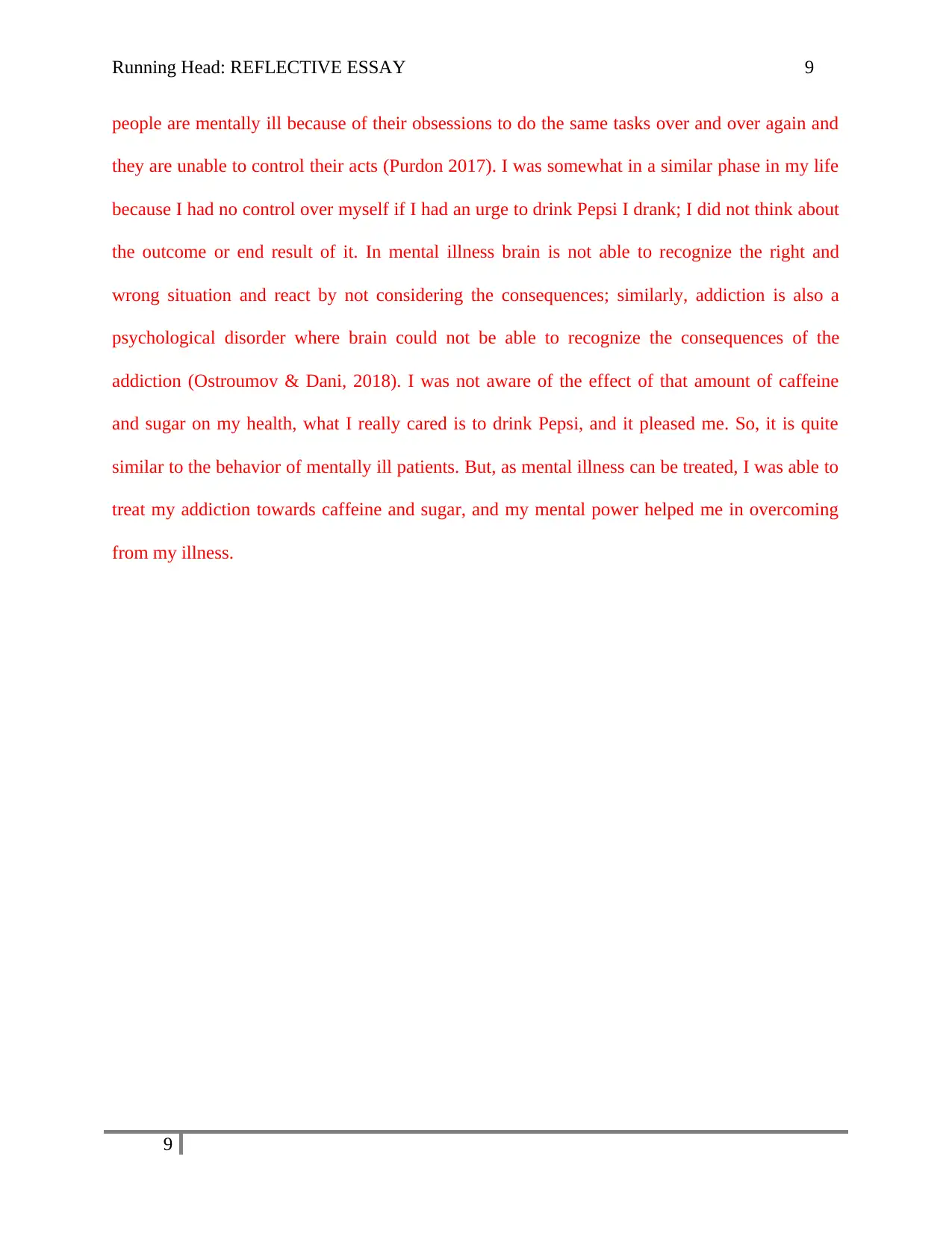
Running Head: REFLECTIVE ESSAY 9
people are mentally ill because of their obsessions to do the same tasks over and over again and
they are unable to control their acts (Purdon 2017). I was somewhat in a similar phase in my life
because I had no control over myself if I had an urge to drink Pepsi I drank; I did not think about
the outcome or end result of it. In mental illness brain is not able to recognize the right and
wrong situation and react by not considering the consequences; similarly, addiction is also a
psychological disorder where brain could not be able to recognize the consequences of the
addiction (Ostroumov & Dani, 2018). I was not aware of the effect of that amount of caffeine
and sugar on my health, what I really cared is to drink Pepsi, and it pleased me. So, it is quite
similar to the behavior of mentally ill patients. But, as mental illness can be treated, I was able to
treat my addiction towards caffeine and sugar, and my mental power helped me in overcoming
from my illness.
9
people are mentally ill because of their obsessions to do the same tasks over and over again and
they are unable to control their acts (Purdon 2017). I was somewhat in a similar phase in my life
because I had no control over myself if I had an urge to drink Pepsi I drank; I did not think about
the outcome or end result of it. In mental illness brain is not able to recognize the right and
wrong situation and react by not considering the consequences; similarly, addiction is also a
psychological disorder where brain could not be able to recognize the consequences of the
addiction (Ostroumov & Dani, 2018). I was not aware of the effect of that amount of caffeine
and sugar on my health, what I really cared is to drink Pepsi, and it pleased me. So, it is quite
similar to the behavior of mentally ill patients. But, as mental illness can be treated, I was able to
treat my addiction towards caffeine and sugar, and my mental power helped me in overcoming
from my illness.
9
⊘ This is a preview!⊘
Do you want full access?
Subscribe today to unlock all pages.

Trusted by 1+ million students worldwide
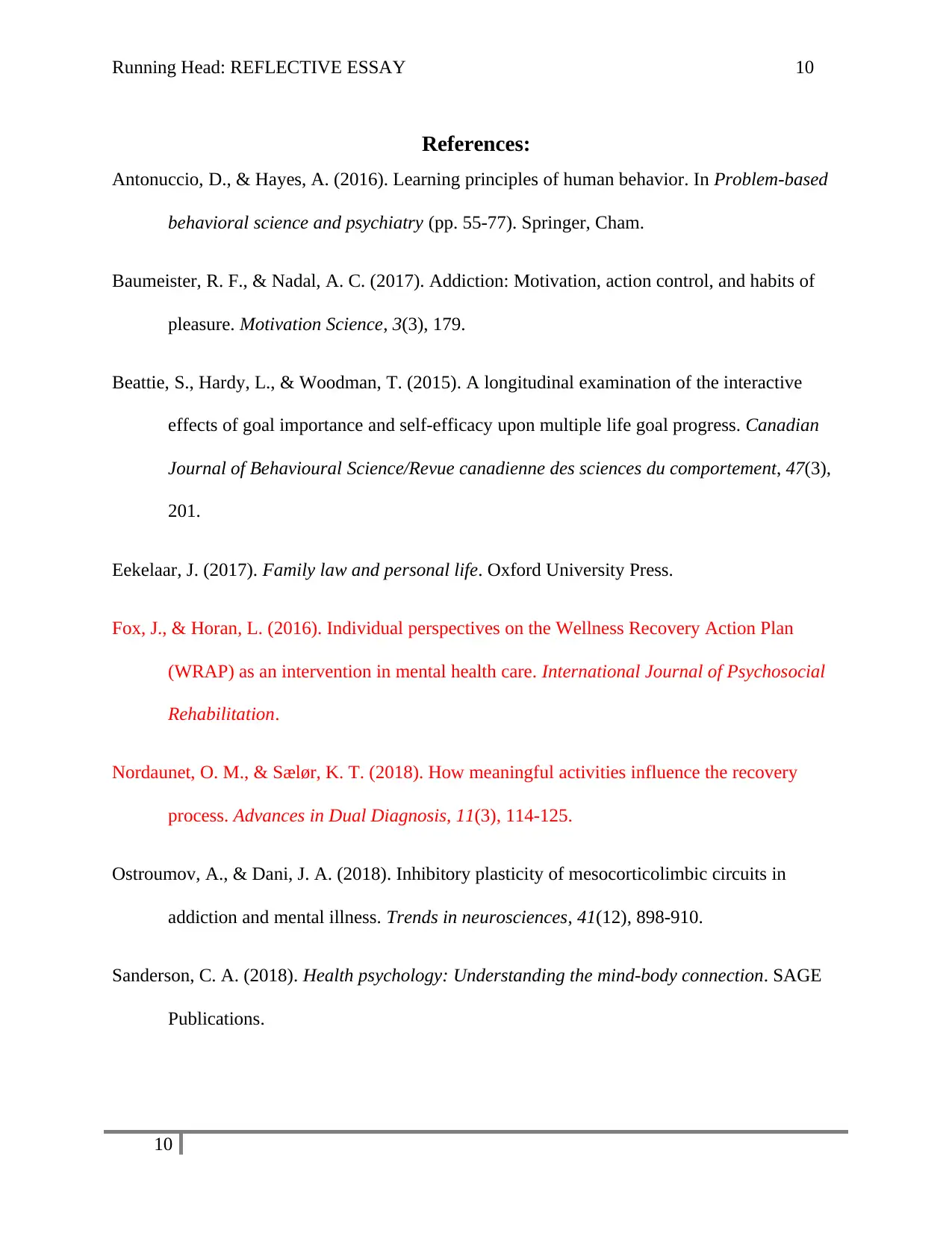
Running Head: REFLECTIVE ESSAY 10
References:
Antonuccio, D., & Hayes, A. (2016). Learning principles of human behavior. In Problem-based
behavioral science and psychiatry (pp. 55-77). Springer, Cham.
Baumeister, R. F., & Nadal, A. C. (2017). Addiction: Motivation, action control, and habits of
pleasure. Motivation Science, 3(3), 179.
Beattie, S., Hardy, L., & Woodman, T. (2015). A longitudinal examination of the interactive
effects of goal importance and self-efficacy upon multiple life goal progress. Canadian
Journal of Behavioural Science/Revue canadienne des sciences du comportement, 47(3),
201.
Eekelaar, J. (2017). Family law and personal life. Oxford University Press.
Fox, J., & Horan, L. (2016). Individual perspectives on the Wellness Recovery Action Plan
(WRAP) as an intervention in mental health care. International Journal of Psychosocial
Rehabilitation.
Nordaunet, O. M., & Sælør, K. T. (2018). How meaningful activities influence the recovery
process. Advances in Dual Diagnosis, 11(3), 114-125.
Ostroumov, A., & Dani, J. A. (2018). Inhibitory plasticity of mesocorticolimbic circuits in
addiction and mental illness. Trends in neurosciences, 41(12), 898-910.
Sanderson, C. A. (2018). Health psychology: Understanding the mind-body connection. SAGE
Publications.
10
References:
Antonuccio, D., & Hayes, A. (2016). Learning principles of human behavior. In Problem-based
behavioral science and psychiatry (pp. 55-77). Springer, Cham.
Baumeister, R. F., & Nadal, A. C. (2017). Addiction: Motivation, action control, and habits of
pleasure. Motivation Science, 3(3), 179.
Beattie, S., Hardy, L., & Woodman, T. (2015). A longitudinal examination of the interactive
effects of goal importance and self-efficacy upon multiple life goal progress. Canadian
Journal of Behavioural Science/Revue canadienne des sciences du comportement, 47(3),
201.
Eekelaar, J. (2017). Family law and personal life. Oxford University Press.
Fox, J., & Horan, L. (2016). Individual perspectives on the Wellness Recovery Action Plan
(WRAP) as an intervention in mental health care. International Journal of Psychosocial
Rehabilitation.
Nordaunet, O. M., & Sælør, K. T. (2018). How meaningful activities influence the recovery
process. Advances in Dual Diagnosis, 11(3), 114-125.
Ostroumov, A., & Dani, J. A. (2018). Inhibitory plasticity of mesocorticolimbic circuits in
addiction and mental illness. Trends in neurosciences, 41(12), 898-910.
Sanderson, C. A. (2018). Health psychology: Understanding the mind-body connection. SAGE
Publications.
10
Paraphrase This Document
Need a fresh take? Get an instant paraphrase of this document with our AI Paraphraser
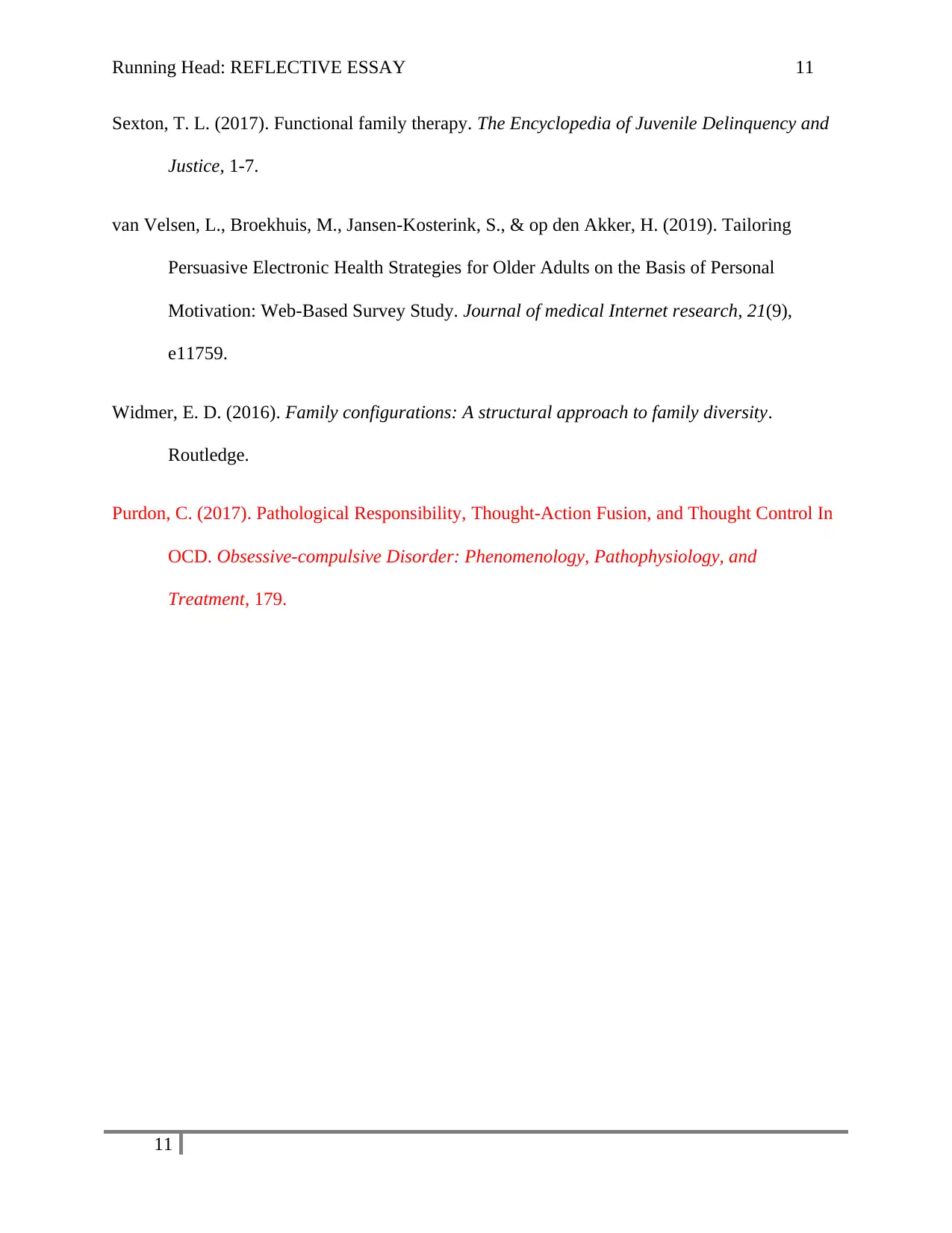
Running Head: REFLECTIVE ESSAY 11
Sexton, T. L. (2017). Functional family therapy. The Encyclopedia of Juvenile Delinquency and
Justice, 1-7.
van Velsen, L., Broekhuis, M., Jansen-Kosterink, S., & op den Akker, H. (2019). Tailoring
Persuasive Electronic Health Strategies for Older Adults on the Basis of Personal
Motivation: Web-Based Survey Study. Journal of medical Internet research, 21(9),
e11759.
Widmer, E. D. (2016). Family configurations: A structural approach to family diversity.
Routledge.
Purdon, C. (2017). Pathological Responsibility, Thought-Action Fusion, and Thought Control In
OCD. Obsessive-compulsive Disorder: Phenomenology, Pathophysiology, and
Treatment, 179.
11
Sexton, T. L. (2017). Functional family therapy. The Encyclopedia of Juvenile Delinquency and
Justice, 1-7.
van Velsen, L., Broekhuis, M., Jansen-Kosterink, S., & op den Akker, H. (2019). Tailoring
Persuasive Electronic Health Strategies for Older Adults on the Basis of Personal
Motivation: Web-Based Survey Study. Journal of medical Internet research, 21(9),
e11759.
Widmer, E. D. (2016). Family configurations: A structural approach to family diversity.
Routledge.
Purdon, C. (2017). Pathological Responsibility, Thought-Action Fusion, and Thought Control In
OCD. Obsessive-compulsive Disorder: Phenomenology, Pathophysiology, and
Treatment, 179.
11
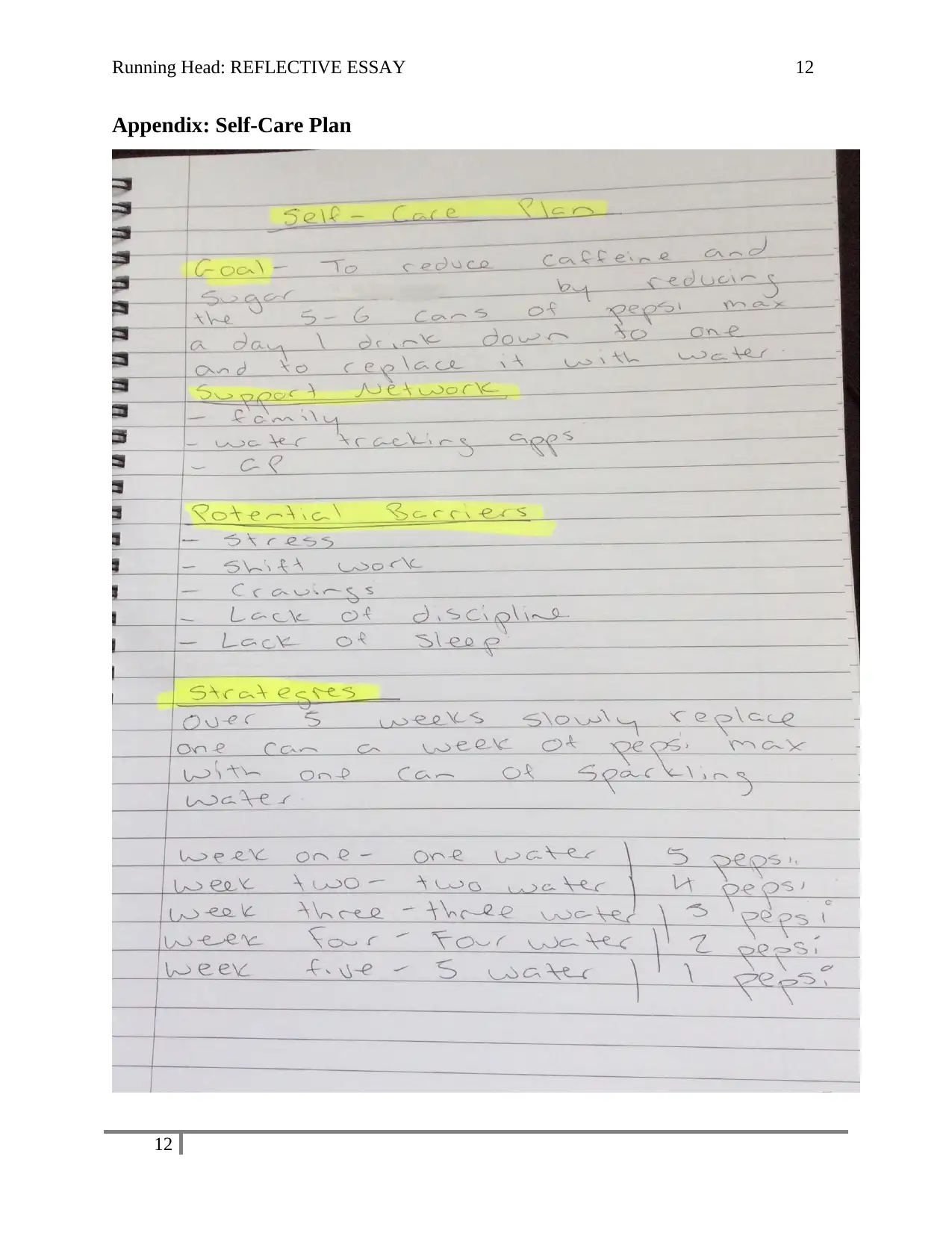
Running Head: REFLECTIVE ESSAY 12
Appendix: Self-Care Plan
12
Appendix: Self-Care Plan
12
⊘ This is a preview!⊘
Do you want full access?
Subscribe today to unlock all pages.

Trusted by 1+ million students worldwide
1 out of 12
Related Documents
Your All-in-One AI-Powered Toolkit for Academic Success.
+13062052269
info@desklib.com
Available 24*7 on WhatsApp / Email
![[object Object]](/_next/static/media/star-bottom.7253800d.svg)
Unlock your academic potential
Copyright © 2020–2026 A2Z Services. All Rights Reserved. Developed and managed by ZUCOL.




